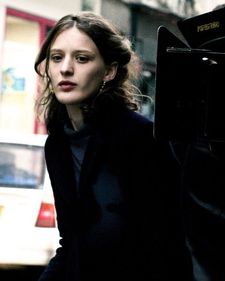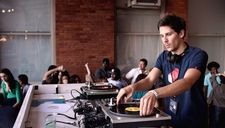 |
| Mia Hansen-Løve: " I feel I became an adult very young …" |
All four of Mia Hansen-Løve’s feature films are autobiographical in one way or another. Eden is explicitly based on Hansen-Løve’s older brother, Sven, a former dee-jay who co-wrote this incidental history of the French Touch music scene. Running parallel to the ascendancy of Daft Punk, Eden stretches from the early 1990s to the recent past, chronicling 20 years in the life of a Parisian DJ named Paul (Félix de Givry). Hansen-Løve (34), whose husband (and father of her daughter six-year-old Vicky) is director Olivier Assayas, tells Richard Mowe about working with Sven, growing up fast, the music scene and her next outing with Isabelle Huppert.
Richard Mowe: Tell me about your relationship with the music scene you portray in the film?
Mia Hansen-Løve: When I started writing the film I thought that this was going to be my most joyful film so far. And I still think that the film is about happiness, joy and partying - but I did not realise how melancholic the film was also going to be. I had always listened to this music a lot when I was younger but without really knowing why. It was just part of my landscape - my brother was a dee-jay and I would go to his parties and listen to it there. The music moved me but I was not sure why.
RM: Can you tell us about the collaboration in the writing process with your brother Sven. Did the work bring you two closer together?
MHL: Yes it did actually. We were already close of course - we had always been. But we had never spent so much time together like that and we have spent the last three years together during the writing and the preparation. He helped me with the work on the music and getting the rights, and also on the choice of the sets and the discussions with the designers about recreating the different locations. At first I was not sure I was capable of working with someone else. My first three films were written on my own and this was the first time I had contemplated working with another person. And the way it went was that at first I asked him to write not even scenes but parts of dialogue and group scenes which were inspired by him and his friends. He was able to bring his own tone and humour. So first he started writing here and there and I enjoyed so much what he was doing that I realised he could bring even more to the film and influence it in the right way. The longer it went on the more he became involved so it developed into a true co-writing partnership. I always took care of the structure and the choice of the characters and where they were going - he was not so curious about was happening to the characters. He was cool about it - but he was too shy to write his own story - but it was possible because I was doing it.
RM: Was it risky to choose actors for the main protagonists who were not experienced?
MHL: It is always risky but at the same time he is supposed to be 16 when the film starts and by the time it ends he is supposed to be 36. I had to make a choice and ended up casting someone who is 21 because I thought it was important he was really young in the first part of the film. I could not envisage any of the obvious and famous young French actors in this part. I wanted, for the authenticity of the character, to have someone who was not necessarily a professional actor but somebody who would be at ease with the music and had an interest in it. Otherwise you would be able to feel a disconnect. I knew it was going to be a long process and a real adventure and the relationship I would have with this actor would be more interesting if we could talk about music and not only pretend he likes it. Félix [de Givry] originally had been cast in Olivier Assayas’s film Something In The Air but only in a very small role. Olivier remembered him and I had seen his casting for Olivier’s film and I thought he had a very interesting presence - he had a maturity and a self-confidence but also an innocence and spontaneity which young actors can have over those who are more experienced. I found out that he was also a music producer while he was still studying. He was fascinated by music and he felt connected to the story and was passionate about it. It was the first time I had felt so close to an actor during the whole process, although I always enjoy the work with actors. I really had the feeling that the three of us (Mia, Sven and Félix) were all doing the film together.
 |
| Félix de Givry in Eden: “Maturity and a self-confidence but also an innocence and spontaneity …" |
RM: Where did the idea come from to tell what is essentially the story of your brother - give or take?
MHL: The first thought was not to make this film about this world and this music - it was more about doing a portrait of my brother with the idea also of doing a story about my generation. The idea came along after Goodbye First Love which I thought was more of a timeless film. It was about my youth but it could have happened at any time, albeit inspired by my adolescence. I thought of looking at the same period of time, but not with the perspective of being personal, but rather looking at the people around me. I felt that my brother was at the end of a certain part of his life and he was trying to start a new life and it was the right moment for me to look back. I had the feeling that the film should be more collective.
RM: Did you have a clear idea of exactly where it was all going?
MHL: Often when I start writing a script I do not how it is all going to end in terms of the dramatic curve and where it is going to go but often I have a couple of images that are there from the start and can give it all meaning even if I do not know what it is at the time. My brother likes poetry and some of his short stories have been published. He has always given me lots of poetry books which have helped me in my life. When I wrote Eden I fell back on the poem Rhythm, which found its place in the film. My brother looks so young even though he is eight years older than me and he is not happy with that because he wants to look older - like a man rather than a young man. Strangely night clubbing and that kind of life seems to keep people looking young even thought they may be in their forties.
RM: Were you happy enough to leave your youth behind?
MHL: I am not sure. I feel I became an adult very young. I left my parents’ home when I was very young and so did my brother although his idea was just to do his own thing. I left because he left - and I wrote my first film when I was 23 and filmed it when I was 25. I had the feeling I became an adult when I was 21 and had this feeling that I wanted to make films. At that time I would have said I feel like an adult and felt very mature. When I did Eden I had the feeling that I had left my youth behind too fast and I wanted to go back there. That was one of the deep reasons I wanted to make this film. For my brother doing the film was more about turning the page and moving on and for me it was more about the making the experience of my youth again. Clubbing is a bit about escaping from the realities of everyday life.
RM: Music has been important in all your films - how do you make the choices?
MHL:One thing that is common to all my films is that I never work with composers. I was always interested in using existing music. I do not like the idea that a composer would see my film and then create a score that would comment or support my film and that would be the only reason for its existence. I like the idea that the music has nothing to do with my film originally and that I can engineer a meeting between these two worlds by using it. The music should open the door to another world and it should have its own soul while bringing a new dimension to the film. Music is kind of sacred - and the specific choices are made to reflect the interior of a scene. Eden does not have any additional music - all the songs you hear start in the scene and the characters hear it before we do.
RM: Will your cinema continue in a very personal vein?
MHL:I think it will although I would like to do a period film and a thriller but I am not sure I am capable. Certainly the desire is there. I feel there are plenty of personal stories to tell but even if I go off in a different direction I think it would still be very personal. I do not really know any other way. I am working next with Isabelle Huppert on a film in which she plays a philosophy teacher. I wrote it two years ago while we were still waiting to get the finance together for Eden.
Eden now on release in the UK.
Richard Mowe interviewed Mia Hansen-Løve at the Unifrance Rendez-vous with French Cinema earlier in the year.





















